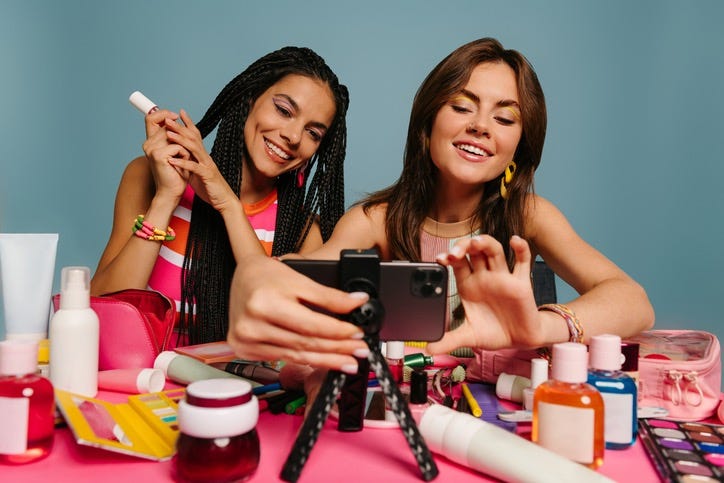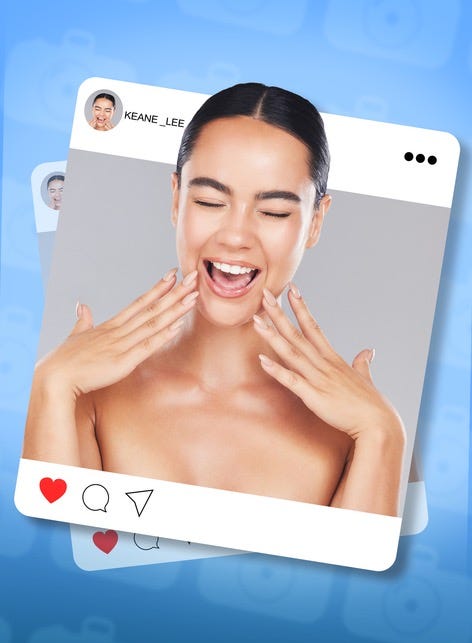Social Media’s Pretty Privilege Problem
How unpacking influencer culture with our teens might help.
A NOTE: I am on vacation (is that what you call it when it’s comprised of 17 family members?) and am doing my damndest not to be on my computer. I want to wish all of you who celebrate, a very happy Thanksgiving. I am truly grateful to all of you who subscribe, comment, send me thoughtful emails, and engage with each other. Writing this newsletter has been my therapy since the election and it means the world to hear that it’s been keeping some of you sane too. I am so excited to see where it takes us!
This week’s guest post is by psychologist and eating disorder specialist,
. Check out her Substack, A Side of Freud for more thoughtful posts and enjoy this one she kindly wrote for The Feminist Parent community!XoJo-Ann

TikTok is in hot water for the practice of “boosting attractive people.” Following an internal investigation, documents revealed that TikTok adjusted its algorithm to “reduce visibility” of those they do not deem attractive. The internal report also alleges that TikTok can “hook” teens within 35 minutes of use. These findings demonstrate the perfect storm teens face on social media. Boosting attractive people perpetuates impossible beauty standards, and the addictive nature of the platform ensures the cycle never stops.
Boosting attractive people perpetuates impossible beauty standards, and the addictive nature of the platform ensures the cycle never stops.
While teens have historically equated attractiveness with being well-liked and popular, the current online landscape imbeds pretty privilege even deeper in our culture. It’s time we start talking to our girls about what “pretty privilege” means in our social media focused world, — and giving them tools and perspectives that will help them untangle their value from their appearance.
The narrative that a woman’s worth is connected to her appearance is a timeless story that haunts us all. I loved reading “Pretty Privilege & Power: Facing harassment in a beauty-obsessed world,” which describes the damaging cycle women can find themselves in. So many of us have internalized the belief that worth is connected to appearance, and as Jo-Ann eloquently pointed out, none of us is immune from the temptation to smile and look pretty.
While reading it, I was reminded of an experience I had with my own mother when I was younger. Initially, she lamented having to endure the lifelong male gaze, but she was quick to add that I would, in fact, “miss” that kind of attention one day. When I commented on Jo-Ann’s article, retelling that story, my mom (my biggest Substack fan) read it and started to defend herself. I held my ground, and she apologized, knowing that enforcing the connection between beauty and worth can be damaging to young women (and women of any age). Honestly, my mom did her best. She taught me many feminist values early on in life, but the idea that young women should derive their self-worth from their appearance is deeply entrenched in our collective psyche.
So many mothers struggle to help their daughters decouple worth from beauty. So how can we help girls disentangle this belief when their online experience shows them that pretty girls get the attention—and might even earn a ton of money?

As Jo-Ann points out, it’s important to help them “unlearn deep social conditioning by talking directly about sexism and encouraging them to use privilege, when they have it, responsibly.”
Of course, that’s a big ask, and easier said than done, especially given that most of us in the position of educating young women didn’t grow up with the internet. Nor do we have any tried and true, practical resources for helping our teens build social media navigation skills. There is no driver’s ed for Instagram. There are no road manuals for TikTok. As parents, we are having to piece together our own best practices for explaining the dangers of social media.
Still, educating our daughters before turning over the keys to social media is a worthy mission.
Having worked with teens for years as an eating disorder specialist, I know it’s important to slow down and make space for dialogue. Girls would certainly benefit from better understanding influencer culture and how social media “realities” aren’t usually reality at all. Even if they roll their eyes at us, these conversations could help our teens add some much-needed skepticism to their online lives. The hope is they will begin to categorize the pretty privilege they see on social media for what it often is: paid advertisers getting intentionally boosted.
To drive these points home (get it?), I’d start with two “modules”:
1. Influencer culture is largely shaped by money and consumerism.
2. Influencers are human, too.
First, consumerism. Influencers have been around for decades—maybe even centuries if you consider that Roman gladiators actually endorsed products. But the paid influencers that we have become accustomed to are relatively new.
The overexposure of these influencers—and the lack of clarity around the fact that they are paid for their content and perspectives—leaves teens incredibly vulnerable. And it's not just teens, either. Adults are susceptible to being sold plenty of myths by influencers, as I discussed in a recent TIME article on how “trad wife” influencers profit from the illusion of slow living and homemaking. What’s hard for teens to understand is that influencer culture is not just about fun dances and ’fit checks.
If we want to dismantle the harmful connection between beauty and worth online, we must educate kids about how brands are using influencers—and their high levels of engagement—to sell products via social media.
A simple conversation explaining how influencers make their money on social media might lead to healthy skepticism in your teen. When I was young, just seeing all the kids at school with a certain product was enough to make me want said product. Even if they can’t always understand the pressure involved in influencer culture, they can certainly understand peer pressure. So, I would suggest parents come to the conversation with a tremendous amount of empathy. “It is so hard to see someone you like online and think you need have what they have in order to fit in.”
Then, parents can remind their kids that what they’re seeing isn’t authentic, digging into the economics of it all. Influencers get paid to promote products and maintain a certain aesthetic. Would they be wearing that designer’s clothes or using that gadget if they weren’t getting paid? We can’t know. And adding to that, their ability to earn money selling these products is determined by their visibility and engagement on these platforms. With TikTok manipulating the algorithm to promote attractive people, we find ourselves in a vicious cycle: The influencers’ aesthetic determines their earning potential, and the fact that they fit into a certain aesthetic means they get more visibility on the platform, which means our teens see more of them, which may lead to more feelings of desire or inadequacy.
Whew.
Of course, simply understanding the economics of influencer culture doesn’t magically decouple beauty from worth, but it equips our teens to pause and really examine what they’re looking at and why it’s making them feel the way it does.
Next, the novel notion that influencers are humans, just like us. In a 2022 survey, 1 in 4 Gen-Z’ers reported that they have plans to “become an influencer” Even in my son’s second grade class, I definitely spotted a “where you will find me in the future” response that stated, “I will be a famous YouTuber.”
But even though they may appear to lead charmed lives, we’re learning now that the influencers are not alright. Recent information on the state of influencers’ mental health suggests they are suffering emotionally from having to maintain the personas they are selling. They may look happy and perfect and beautiful, but that’s often just the “product,” not the person. Talking to our children about the commercial aspects of influencer culture and the burden of maintaining whatever illusion they are promoting could be a powerful step in encouraging them to look deeper than their appearance when calculating their self-worth. You could read an article together, like this one in which a “rising TikTok star” shares her own guilt around the picture perfect content she shares and how this might deceive her admirers. Or, you might say something like, “When you start to feel jealous, remember these are just humans, this is their job, and they are under tons of pressure to maintain this façade.” Remind them, influencers often have a team of people behind them to help make everything appear perfect but that most people do not look like or act like that without a lot of help.
Again, this isn’t a magical fix, but it is an empowering perspective. Helping our kids notice how they feel when they see an influencer’s content allows them to hit pause, like an internal red flag. When they can think to themselves, “I feel super low, let me take a break,” then they can start to interrupt the cycle.
Obviously, we are so much more than what we look like, but culture has always made it easy to forget that, and now the online landscape and its biased algorithms are actively working against the mission to disentangle young women’s self-worth from their beauty. We need to continue to find ways to talk to our girls about all the pitfalls of social media and guide them toward deepening their sense of self and community in the real world, as well as online.






This was a great read, thank you! For my own daughters, I am adding a third item I refer to as social media hygiene. I plan to teach my kids how to curate their feeds so that they see content tailored to their needs/likes rather than generic drivel that tends toward pretty-privileged content. For example, by being super diligent about where I click or hover and what I watch, I can avoid diet content and stay in the anti-diet space even though the diet content is 100x more click-bait worthy.
Influencing is hell. Constant content capture and edit, community moderating, abusive crazies in your DMs, obsessing over analytics. I briefly knew an early days IG model. She was gorgeous, affluent, sweet - and nearly cracking from the pressure. No enjoyment of all that youth and privilege. Your existence is work. I wish kids saw the grind and neurosis of it. It’s ugly and deeply dehumanizing. Most make less than $2k a year.